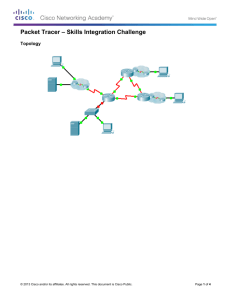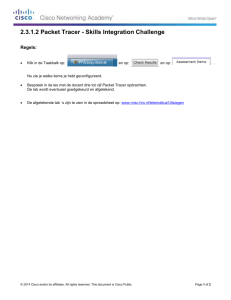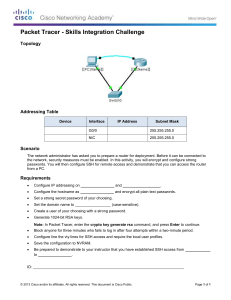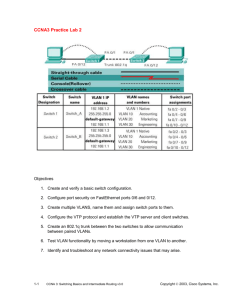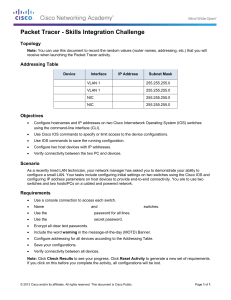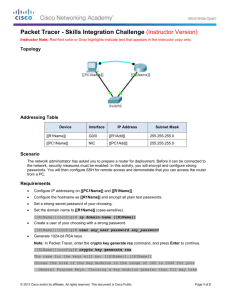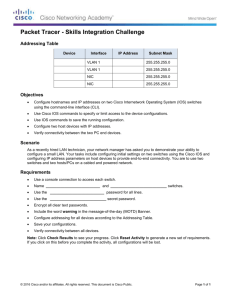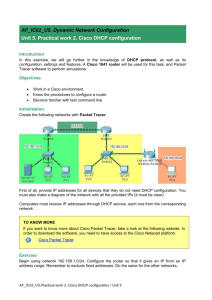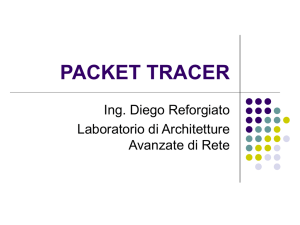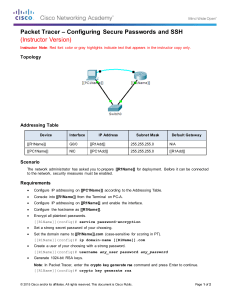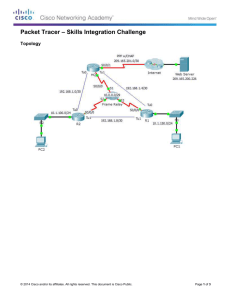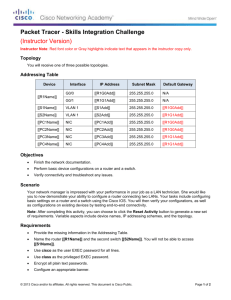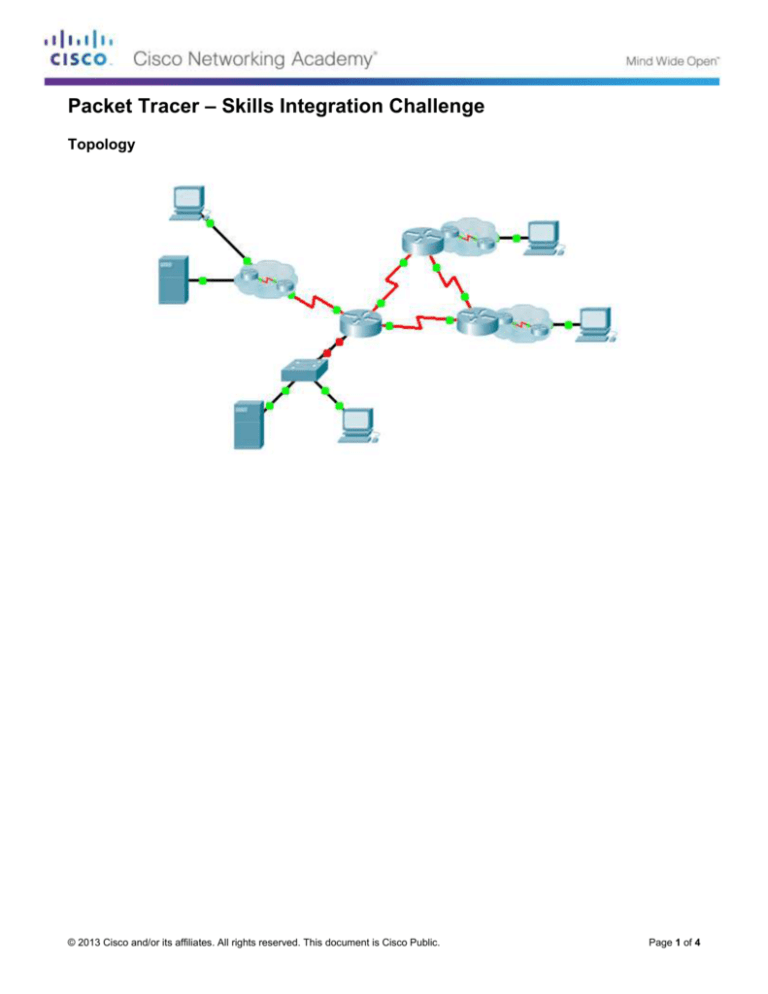
Packet Tracer – Skills Integration Challenge
Topology
© 2013 Cisco and/or its affiliates. All rights reserved. This document is Cisco Public.
Page 1 of 4
Packet Tracer – Skills Integration Challenge
Addressing Table
Device
Interface
[[R1Name]]
IP Address
Subnet Mask
G0/0.15
N/A
G0/0.30
N/A
G0/0.45
N/A
G0/0.60
N/A
S0/0/0
255.255.255.252
N/A
S0/0/1
255.255.255.252
N/A
S0/1/0
255.255.255.252
N/A
G0/0
[[R2Name]]
N/A
S0/0/0
255.255.255.252
N/A
S0/0/1
255.255.255.252
N/A
G0/0
[[R3Name]]
Default Gateway
N/A
S0/0/0
255.255.255.252
N/A
S0/0/1
255.255.255.252
N/A
DHCP Assigned
DHCP Assigned
[[S1Name]]
VLAN 60
[[PC1Name]]
NIC
DHCP Assigned
VLANs and Port Assignments Table
VLAN Number - Name
Port assignment
15 - Servers
F0/11 - F0/20
30 - PCs
F0/1 - F0/10
45 - Native
G1/1
60 - Management
VLAN 60
Network
Scenario
This culminating activity includes many of the skills that you have acquired during this course. First, you will
complete the documentation for the network. So make sure you have a printed version of the instructions.
During implementation, you will configure VLANs, trunking, port security and SSH remote access on a switch.
Then, you will implement inter-VLAN routing and NAT on a router. Finally, you will use your documentation to
verify your implementation by testing end-to-end connectivity.
Documentation
You are required to fully document the network. You will need a print out of this instruction set, which will
include an unlabeled topology diagram:
© 2013 Cisco and/or its affiliates. All rights reserved. This document is Cisco Public.
Page 2 of 4
Packet Tracer – Skills Integration Challenge
-
Label all the device names, network addresses and other important information that Packet Tracer
generated.
-
Complete the Addressing Table and VLANs and Port Assignments Table.
-
Fill in any blanks in the Implementation and Verification steps. The information is supplied when
you launch the Packet Tracer activity.
Implementation
Note: All devices in the topology except ________________, ________________, and ________________
are fully configured. You do not have access to the other routers. You can access all the servers and PCs for
testing purposes.
Implement to following requirements using your documentation:
________________
Configure remote management access including IP addressing and SSH:
-
Domain is cisco.com
-
User ________________ with password ________________
-
Crypto key length of 1024
-
SSH version 2, limited to 2 authentication attempts and a 60 second timeout
-
Clear text passwords should be encrypted.
Configure, name and assign VLANs. Ports should be manually configured as access ports.
Configure trunking.
Implement port security:
-
On Fa0/1, allow 2 MAC addresses that are automatically added to the configuration file when
detected. The port should not be disabled, but a syslog message should be captured if a violation
occurs.
-
Disable all other unused ports.
________________
Configure inter-VLAN routing.
Configure DHCP services for VLAN 30. Use LAN as the case-sensitive name for the pool.
Implement routing:
-
Use OSPF process ID 1 and router ID 1.1.1.1
-
Configure one network statement for the entire ________________ address space
-
Disable interfaces that should not send OSPF messages.
-
Configure a default route to the Internet.
Implement NAT:
-
Configure a standard, one statement ACL number 1. All IP addresses belonging to the
________________ address space are allowed.
-
Refer to your documentation and configure static NAT for the File Server.
-
Configure dynamic NAT with PAT using a pool name of your choice, a /30 mask, and these two public
addresses:
________________
________________
© 2013 Cisco and/or its affiliates. All rights reserved. This document is Cisco Public.
Page 3 of 4
Packet Tracer – Skills Integration Challenge
Verify ________________ has received full addressing information from ________________.
Verification
All devices should now be able to ping all other devices. If not, troubleshoot your configurations to isolate and
solve problems. A few tests include:
Verify remote access to ________________ by using SSH from a PC.
Verify VLANs are assigned to appropriate ports and port security is in force.
Verify OSPF neighbors and a complete routing table.
Verify NAT translations and statics.
-
Outside Host should be able to access File Server at the public address.
-
Inside PCs should be able to access Web Server.
Document any problems you encountered and the solutions in the Troubleshooting Documentation
table below.
Troubleshooting Documentation
Problem
Solution
Suggested Scoring Rubric
Packet Tracer scores 70 points. Documentation is worth 30 points.
© 2013 Cisco and/or its affiliates. All rights reserved. This document is Cisco Public.
Page 4 of 4

